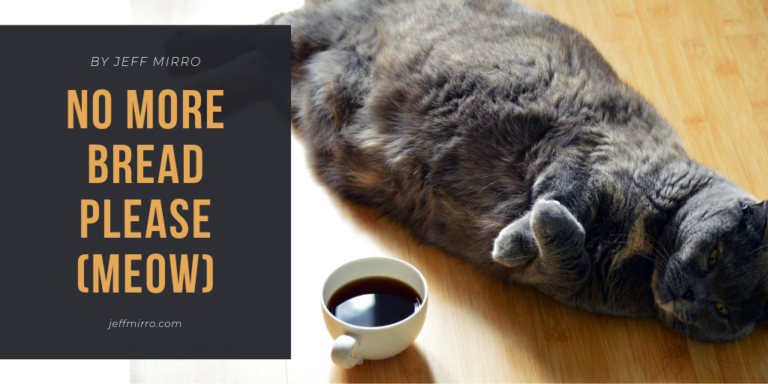Breakfast is the most important meal of the day. You’ve heard that all your life. But is it really true? Yes and no.
Check out Cole Robinson’s video from May 7, 2019, on this topic:
Why Breakfast is the One Meal a Day Weight Loss King
Most people in the alternative health industry knew this NOT to be true for decades. There was a general consensus that skipping breakfast was a good thing, and this viewpoint became even stronger as the intermittent fasting craze got more popular over the past few years. And while a recent mainstream study came out and spoke of the dangers of skipping breakfast, we all know that most mainstream studies and health information is garbage anyway, and this one is no exception. Skipping meals, in general, is a great idea if you want to be healthy and lean, especially if you are creating a narrow eating window and fasting the rest of the day on water or on nothing, such as an intermittent dry fast. This type of infrequent eating schedule is great for lowering inflammation, resetting your immune system, clearing up digestive problems and skin issues, and getting ripped.
Still, is it Smart to Skip Breakfast?
However, does that mean that breakfast is the meal you should be skipping? I always thought that it was the most convenient meal to skip, and the best one to skip for your health if you are living a fasting-focused lifestyle. And if you are doing OMAD, prior to Cole’s recent two videos on breakfast, I believed that dinner was the most practical time to have your one meal a day. For most people, and probably for myself as well, I still believe this to be true. It’s probably easier that way. But is it optimal for your health under this type of intermittent fasting program? No, I’d now say that breakfast is the one meal you should be eating each day, and then not eating again for the rest of the day if you want to achieve optimal health and wellness and burn fat as quickly as possible.
Please watch that video, and the longer one before it if you have time because Cole breaks it all down in great detail. But there are two main things I took away from his advice and from this way of eating and fasting.
Benefits to Eating Breakfast as Your One Meal a Day
First off, if you eat your one big meal early in the day, sometime in the morning, you have all day to be active, work out, and burn off any calories and carbs you consumed during that meal, rather than going to sleep on it and having it accumulate as fat. There’s an argument to be made for lunch being your one big meal too, but that’s just complicating things. For a lot of the reasons Cole describes in his videos, breakfast is your best bet when doing OMAD.
Secondly, besides having a better opportunity to give your digestive system a break, burn more fat, lose more weight, and have more energy for a workout later in the day, eating breakfast as your only meal of the day allows you to sleep better too. You might be a little bit hungry by the time evening hits, but you’ll sleep much better in that state, being a little hungry with an empty stomach, than you would on a full stomach after eating a huge meal. Speaking of huge meals, I would recommend that if you are going to try out this strategy, and you aren’t looking to lose a lot of weight, that you eat a gigantic meal to ensure it sustains you throughout the day and into the following morning. It should be a meal high in fat, moderately high in protein and moderately low in carbs.
The amount of carbs really depends on your planned level of activity. If you’re going to have a very active day with an intense workout, you can afford to eat more carbs than usual. If you are not working out that day or know that you will have a relatively inactive day, I would minimize carbs during that meal. Then, of course, there’s a school of thought that you shouldn’t eat carbs period, the carnivore diet way of eating, and as controversial as it seems, I think there is some validity to it. You might want to try it out and see how you feel on it.
Works Well for Weight Loss or Weight Maintenance
I’d personally recommend that if you have a ton of fat to burn and a big weight loss goal, besides doing some extended 48 and 72-hour fasts, that you do OMAD on your refeed days and only eat breakfast. If you really want to speed up results, keep this meal small, to about 500 calories. Also, keep it as low-carb as possible. I would only do this on the day you break your fast, and then resume eating a normal amount of calories (1,500-2,000) until you start your next fast. Eating 500 calories a day can actually be tougher than fasting itself, especially if it’s on an ongoing basis, and it could be dangerous, so make sure you definitely have body fat to lose, and that you resume eating a normal amount of calories the following day.
However, if you’re looking to either bulk and add muscle, or maintain your current physique as I am, then make sure you get in enough calories and fat during breakfast. Or, if you want to try this strategy out with lunch instead, or stay on track with dinner being your only meal of the day, that will work too. I will likely keep eating dinner, but I may experiment with breakfast on OMAD in the near future. After all, this fasting-focused lifestyle is all about feeling good and being healthy, having more energy for workouts and life in general, and for some people, even looking good. If that is your goal, then I urge you to try different things out and experiment with different methods of intermittent fasting and intermittent dry fasting. Find the one that fits the best into your life and also has the best effect on your body. But the most important thing of all is to never go back to the snacking, grazing, multiple meals a day lifestyle and making the commitment to living a fasting-focused lifestyle, with all the benefits of autophagy, weight loss, lower inflammation, and great overall health and wellness.




